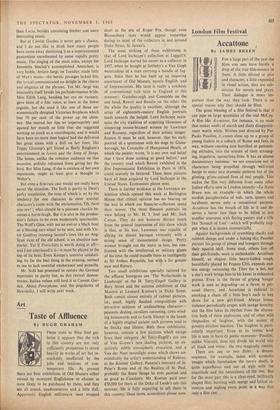London Film Festival
Accattone
By JAMES BREEN
Foa a large part of the year tha films one sees have hardly a drop of the true film-essence in them. A little diluted in plot and character, a little expanded The great blessing of a film festival is that it can pipe us large quantities of the real McCoy.
A film like Accattone, for instance, is an oasis that makes weeks of search and dusty disappoint- ment worth while. Written and directed by Pier Paolo Pasolini, it comes close up to a group of young loafers in a suburb of Rome and feels its way, without reacting into horrified or patronis- ing attitudes, into the texture of their scroung- ing, impulsive, uproarious lives. It has an almost documentary leanness: we are conscious not of characters being propelled through well-tried hoops to make nice dramatic patterns but of the glinting, grime-stained lives of real people. This makes the film very different from some other Italian efforts seen in London recently—La Notte Brava was an example—in which the whole modish paraphernalia of teds, tarts, queers and layabouts serves only a sensational purpose. Accattone has the breath of life in it and de- serves a better fate than to be billed as just another sexerama with flaring posters and a title like 'Screech of Lust'—which will probably hap- pen when it is shown commercially.
Against backgrounds of crumbling shacks and rubbish dumps and under a baking sky, Pasolini pursues his group of pimps and loungers through their squalid idyll. Some steal, others live off their girl-friends; work is unthinkable. Accattone himself, an elegant little heavy-lidded tough, beautifully played by Franco Citti, expends end- less energy swimming the Tiber for a bet, but a day's work brings him to his knees in exhausted protest. Even in the throes of griping hunger work is seen as degrading—as a threat to per- sonal liberty; and Accattone is reduced to sneaking a chain off a little boy's neck to buy shoes for a new girl-friend. Always latent, violence periodically erupts with savage ferocity; and the film takes its rhythm from the alterna- tion both of these explosions, and of other wild rhapsodies of laughter, with the scenes of poverty-stricken inaction. The laughter is parti- cularly important. Even at its lowest level life is seen to have its poetic moments—Pasolini, unlike Visconti, does not divide his world into all black and white : the two magically coexist.
There are one or two flaws: a dream- sequence, for example, laden with symbolic images which foreshadow the hero's death, is quite superfluous and out of style with the exactitude and the naturalness of the rest. But for the most part this is a clear-eyed, brilliantly shaped film, bursting with energy and lyrical in- vention and making every point in a way that only a film can.














































 Previous page
Previous page